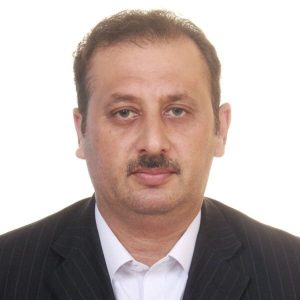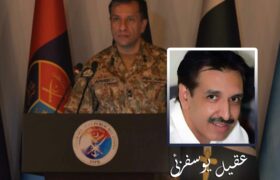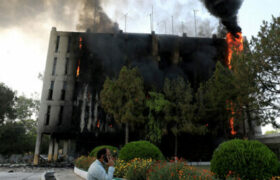Democracy in its true essence is a governing system in which people use the right of their votes to elect a government for a specified tenure; during this period, the voters keep an eye on the performances of the elected governments and re-elect or reject it in next round of elections.
There are two forms of Representative democracy: parliamentary system and presidential system. In parliamentary democracy, the power rests with the Prime Minister of a country while in presidential democracy people elect a president to head the government.
In Parliamentary democracy, a political party is very important organization, which is governed by a constitution and collective wisdom, it is a public property, a voluntary association where every citizen can openly express opinion on public affairs without any fear of repression and can contest as a candidate in elections. In this way, democracy is the government of the people, by the people, for the people.
Pakistan came into being on August 14, 1947 as a result of democratic struggle of the Muslims of Indian subcontinent, since then, there have been dozens of elections leading to democratically elected governments but still the democracy in Pakistan is referred to as incipient, fragile and inconclusive. Why is it so? The proponents of democracy blame military interventions and proclamation of martial laws on regular intervals; they claim that the back-to-back martial laws disrupted the progress of democratic process and did not let the democratic system succeed. While this notion may not be out-rightly wrong, it is however not the main reason for failure of democratic system in Pakistan.
In-fact the main reason for the failure of democracy in Pakistan is the political party system itself, as in Pakistan the political parties instead of a public property have become family enterprises or private limited companies heritable from parents to children and then to grandchildren. From 1947, there are several big and small political parties operating in Pakistan, apart from few, the majority of political parties are practicing hereditary politics, where heir to the party throne is strictly ensured to be a blood relation. It means political parties are not allowing democratic process of free will or choice within the parties when it comes to choosing party’s heads. Our democrats often quote United Kingdom, United States and other European countries when they glorify democracy, however, they are either unable to comprehend or they choose to close their eyes to identify basic differences between Pakistani and Western democracies. In reality, both are completely different systems.
For example, in United States, UK and other European democracies, anybody (member) within the party can come forward and present himself/herself as a candidate for President or Prime Minister elections, we have various examples where the likes of Barak Obama, an ordinary black African-American, contested presidential elections and became the President of the United States. Barak Obama after completing his two tenures as president did not resist leaving his office or recommended his relatives for the next elections; he left the position for other aspirants to the post. Barak Obama had no push in terms of family connections, extravagant wealth or other accessories but was brought to the top by system; the system which is not dependent on personalities but on strong principles. Similarly, in Europe and Australia there are political parties but those parties are not personal properties of certain political families. Elections are held on regular basis where deserving people are chosen while less talented are push to the background.
However, our democratic system primarily serves the interests of elites instead of public; the parliament has in past introduced laws in order to benefit certain personalities. For instance, the parliament under former President Pervez Musharraf passed a law barring a person to become premier of the country for third tenure. However, in 2010 the same parliament under 18th Amendment cancelled the two terms rule just to benefit Muhammad Nawaz Sharif. He became premier for the third time after his party won majority seats during general elections of 2013. When the Supreme Court of Pakistan deposed Nawaz Sharif in 2017 as premier and barred him to head his faction of Pakistan Muslim League (PML-N), National Assembly and Senate hurriedly passed a law enabling him to head his party.
Unfortunately, in Pakistan, the political parties tend to become family hereditary once they come into governments, slowly and gradually supporters and workers accept the family members of their leaders as their destined rulers. For instance, Late Zulfiqar Ali Bhutto formed Pakistan Peoples Party (PPP) and after his death, his daughter late Benazir Bhutto became chairperson of the party. Following the assassination of Benazir Bhutto, now her son Bilawal Bhutto Zardari is heading the party.
Similarly, Nawaz Sharif formed his own faction of Muslim League, the PML-N. After his disqualification by Supreme Court in corruption cases, his brother Shehbaz Sharif was made president of the party, however, there are reports of differences between Shehbaz Sharif and Maryam Nawaz on party’s leadership. Similarly, the rein of Pashtun nationalist Awami National Party (ANP) came into the hands of Asfandiyar Wali Khan and his son Aimal Wali Khan from Khan Abdul Wali Khan and Khan Abdul Ghaffar Khan.
Jamiat Ulema Islam (JUI-F) although a religious party was taken over by Maulana Fazlur Rehman after the death of his father Mufti Mahmood, same is the case with PMLQ, QWP etc. It seems there is nobody else eligible or qualified for the leadership of these parties. Similarly, no party worker or office bearer, how strong he may be, cannot give his/her point of view to oppose certain policies or object to the orders of party head. Opposition to party policies by ordinary workers usually results in their expulsions from the party. The leader run the party like a personal business enterprise or a hereditary property instead of a collective wisdom or free will of the party members. Party head is considered final authority and he makes decisions unitarily and unchallenged.
In our democratic system another flaw which causes failure is that the wealthy elites, industrialists, landlords-feudal, often referred to as electable invest their ill-gotten black money on various political parties and get key important positions in those political parties. After the parties come into power, such opportunist exploits their investment by accruing various legal and illegal benefits. These investors-politicians usually resort to cronyism, nepotism and large-scale corruption which harms the economy and system. Elected governments are reluctant to take action against these corrupt politicians due to fear of losing party funds and number game in parliament.
In such situations when country affairs get out of control and people start street agitation against ‘elected’ governments, the establishment has to act under obligation of national security. Therefore, until and unless political parties are made public property under truly democratic principles instead of family business enterprises and our political leaders consider people the real source of power, democracy cannot deliver or prosper in Pakistan.





